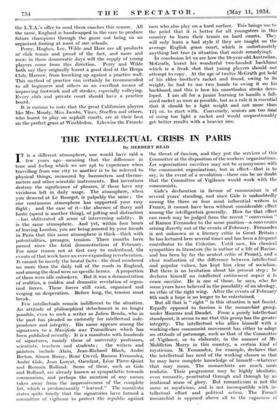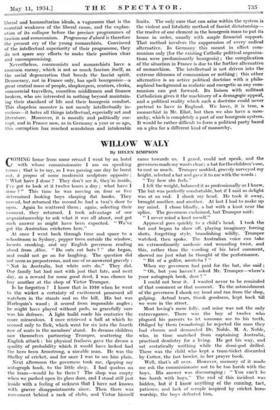THE INTELLECTUAL CRISIS IN PARIS
By HERBERT READ
IT is a different atmosphere, one would have said a few years ago—meaning that the difference in tone and feeling which we are apt to experience when travelling from one city to another is to be referred to physical things, measured by barometers and thermo- meters and other scientific instruments. But inventions destroy the significance of phrases, if these have any vividness left in daily usage. The atmosphere, when you descend at Le Bourget, is palpably the same ; the one continuous atmosphere has supported your easy flight ; and the ease of it—the absence of flurry and haste (speed is another thing), of jolting and distraction —has obliterated all sense of intervening solidity. It is the same atmosphere. And yet, within four hours of leaving London, you are being assured by your friends in Paris that this same atmosphere is thick—thick with potentialities, presages, tension. Three months have passed since the fatal demonstrations of February. For some reason not at first easy to understand, the events of that week have an ever-expanding reverberation. It cannot be merely the brutal facts—the dead numbered no more than the daily toll of the roads in England, and among the dead were no specific heroes. A proportion of them were idle onlookers. But it was a demonstration of realities, a sudden and dramatic revelation of organ- ized forces. These forces still exist, organized and verging on desperation. Before long, the tension must break.
Few intellectuals remain indifferent to the situation. An attitude of philosophical detachment is no longer possible, even to such a writer as Julien Benda, who in the past has pleaded so earnestly for intellectual inde- pendence and integrity. His name appears among the signatures to a Manifeste aux Travailleurs which has been published recently. It is a manifesto with hundreds of signatures, mainly these of university professors, scientists, teachers and students ; the writers and painters include Alain, Jean-Richard Bloch, Andre Breton, Simon Bussy, Rene Crevel, Ramon Fernandez, Andre Gide, Jean Lurcat, Ozenfant, Leon Pierre-Quint and Romain Rolland. Some of these, such as Gide and Rolland, are already known as sympathetic towards communism, and perhaps the mention of any names takes away from the impressiveness of the complete list, which is predominantly " learned." The manifesto states quite briefly that the signatories have formed a committee of vigilance to protect the republic against the threat of fascism, and they put the services of this Committee at the disposition of the workers' organizations. Les organisations ouvrieres may not be synonymous with the communist organizations, but in effect—that is to say, in the event of a revolution—there can be no doubt that the Committee of Vigilance would work with the communists.
Gide's declaration in favour of communism is of several years' standing, and since Gide is undoubtedly among the three or four most influential writers in France, it cannot have been without considerable effect among the intelligentsia generally. How far that effect can reach may be judged from the recent " conversion " of Ramon Fernandez to the same position—a conversion arising directly out of the events of February. Fernandez is not unknown as a literary critic in Great Britain ; he has lectured here several times and has been a frequent contributor to the Criterion. Until now, his classical sympathies in literature (he is author of a life of Racine, and has been by far the acutest critic of Proust), and a clear realization of the difference between intellectual and popular values, has kept him clear of socialism. But there is no hesitation about his present step ; he declares himself un intellectuel entierenient acquis ez la cause ouvriere. He is one of those, he says, who for some years have believed in the possibility of an ideology, an ethic of the right wing. After the events of February 6th such a hope is no longer to be entertained.
But all that is " right " in this situation is not fascist. Equally opposed to fascism is the monarchist group, under Maurras and Daudet. From a purely intellectual standpoint, it seems to me that this group has the greater integrity. The intellectual who allies himself with a working-class communist movement has either to adopt an attitude of patronage, such as that of the Committee of Vigilance, or to elaborate, in the manner of Mr. Middleton Hurry in this country, a certain kind of mysticism. H. Fernandez, for example, declares that the intellectual has need of the working classes so that he may have complete knowledge of himself—whatever that may mean. The monarchists are much more realistic. Their programme may be highly idealistic, even romantic, penetrated through and through by an irrational sense of glory. But romanticism is not the same as mysticism, and is not . incompatible with in- tellectual effort and political action. The French monarchist is opposed above all to the vagueness of liberal and humanitarian ideals, a vagueness that is the essential weakness of the liberal cause, and the explan- ation of its collapse before the preciser programmes of fascism and communism. Programme d'abord is therefore the present cry of the young monarchists. Convinced of the intellectual superiority of their programme, they do not spare any efforts to make their position clear and uncompromising.
Nevertheless, communists and monarchists have a common enemy, which is not so much fascism itself, as the social degeneration that breeds the fascist spirit. Democracy, not in France only, has spelt bourgeoisie—a great central mass of people, shopkeepers, rentiers, clerks, commercial travellers, countless middlemen and finance brokers, who are interested in nothing beyond maintain- ing their standard of life and their bourgeois comfort. This shapeless monster is not merely intellectually in- curious—it hates all things intellectual, especially art and literature. Moreover, it is morally and politically cor- rupt, and in France now, as in Germany a year or so ago, this corruption has reached scandalous and intolerable limits. The only cure that can arise within the system is the violent and fatalistic method of fascist dictatorship— the resolve of one element in the bourgeois mass to put its house in order, usually with ample financial support. That method involves the suppression of every radical alternative. In Germany this meant in effect com- munism only (for the existing Catholic political organiza- tions were predominantly bourgeois) ; the complication of the situation in France is due to the further alternative of monarchism. The intellectual is not driven into the extreme dilemma of communism or nothing ; this other alternative is an active political doctrine with a philo- sophical background as realistic and energetic as any com- munism can put forward. Its liaison with militant Catholicism gives it the machinery of a demagogic appeal, and a political reality which such a doctrine could never pretend to have in England. We have, it is true, a monarchist in Mr. Eliot, but then we also have a mon- archy, which is completely a part of our bourgeois system. It would be rather difficult to form a political party based on a plea for a different kind of monarchy.









































 Previous page
Previous page